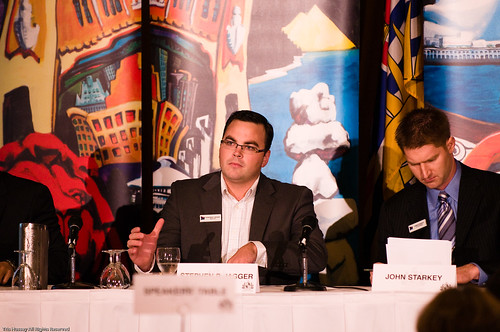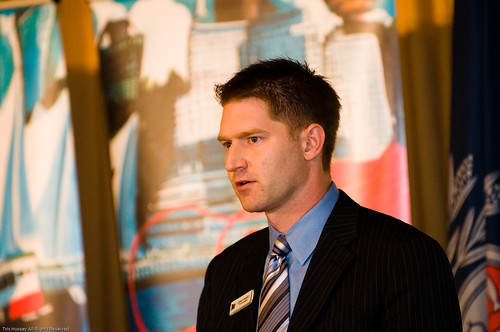Vancouver Board of Trade: Tough Talk for Tender Causes Live Blog
byI am currently in a ballroom of the Renaissance Hotel on West Hastings street to hear a talk from the Vancouver Board of Trade about “communicating via social media” in the non-profit sector in a series called Tough Talk for Tender Causes.
If it seems slightly foreign for an entity such as the Board of Trade to be holding such new media event, fear not – today’s panel consists of some familiar faces such as: Michael Allison, Steve Jagger, and John Starkey along with moderator Colleen Coplick.
Michael is up first, with “reasons why I believe you should be learning about social media.” I first met Michael through Twitter although he’s well versed in the realm of traditional PR. He addresses corporate messaging tactics and notes that blasting a news release to bloggers isn’t the way to go, “at best they may ignore you, at worst – they could call you out or flag you as spam.” His three talking points are, “the changing media landscape, reputation management, and culture.” He says that by using social media for these reasons you can become a leader in your field.
Steve is the second speaker and he’ll talk about how his companies use Twitter to, “create new business, find new clients, and keep in touch with existing clients.” He notes about how they are a “virual company” working out of coffee shops and holding their seminars at Ceilis Irish Pub. The challenges they face revolve around communication and this is where Twitter comes in.
With regards to non-profits he mentions a few times when someone mentioned the UGM in a negative way and how the Union Gospel Mission itself is on Twitter and was able to defend their position and also clarify some of the information being discussed.
Steve is actually explaining Twitter very well – probably the best description of the tool I’ve ever heard in terms of informing non-tech non-web people what it does. After each example he says, “send” just to get the point across about how these are short bursts, short messages.
The final speaker is John Starkey who, after looking at his bio, is also involved with DreamBank (something that I have used and promoted this past summer). He notes that social media tool are, “things that should be very considered very seriously,” when it comes to raising funds and awareness for your cause. “These tools do not replace traditional means but they’re a great way to enhance and compliment them.” John also states that you do not need a big budget for a lot of these tools. “Trust, credibility, and a relationship with those that interact with your content,” is paramount. Some of his tips include, “know when to moderate, get your staff involved, create tags, post contests, make things personal, give them a reason to participate.” In other words, be engaging when you’re using social media – that’s the point of it all, really.
The panelists each mentioned an article recently in The Vancouver Sun about Twitter. I’m not sure if it’s this one, or this one (probably the one featuring Steve, which is cool), but from what I’ve read in traditional media, I really like Jeffery Simpson’s article in The Georgia Straight (something a lot of non-internetty people have told me really helped them learn about social media).
Now into the Q and A, Colleen tosses the question of transparency over to Michael – how important is it to be transparent? Michael gives an example about Wal-Mart (where it seemed like a real/regular couple was sharing heart-warming stories about employees for a blog but it turned out it was all powered and paid for by Wal-Mart’s PR department) – “you are expected to be genuine,” and “make sure you disclose information,” you don’t want to give your readers and clients a sense of betrayal. Feel free to give fair disclosure (like I often do on my posts) – is this article about a client? Did someone pay for this content? What is your real involvement? You can be open without losing your professionalism.
Q and A – Over to Steve now, with so many social media tools, how do you find the time to check Facebook, Twitter, MySpace etc. – which ones are worth investing in? Steve says that you just need to get a feel for what is more productive, while John says cross-posting is key. I would have to disagree with exact “cross-posting”, however cross-promoting works best. For example, I don’t want to see the same message or post on your Facebook account, and all your blogs BUT if you post a link to your story on Twitter, or a link to your story on Facebook, then you’re driving traffic without over-saturating your audience.
Q and A – Why should non-profits use social media? “That’s where their audience is,” notes Michael and another panelist (I didnt’ catch who) said, “it’s free!”. They’re now discussing the major demographics of Facebook (females, 35).
Q and A – How does e-philanthropy fit into social media? John mentions that social media tools are for everyone, big business to small charities. “It’s completely revolutionized the way organizations are engaging.” He also mentions the US elections again.
(No mention so far though of Blogathon Vancouver 2008 as a social media campaign that raised funds for charity – almost $15,000 this past summer! Not something everyone can engage in, but it was good a campaign by 12 bloggers.)
Michael gave an example of a friend that posted a note saying he didn’t want gifts for his birthday this year, only donations to this certain cause. He said by making that statement online and on his social networks donations were made by people that wouldn’t have even given him a birthday gift otherwise.
Question from the audience: How do you find the real organization amidst all the impostor groups on Facebook? Steve Jagger says that you need to announce that you’re the official entity and also, “be louder than the rest.”
Questions from the audience: Micheal, how do you suggest we interact with bloggers? As a traditional PR guy, Michael is the one for this question. “The media has a job to write stories,” however, “the cat lovers’ blog does not have any obligation to blog about Iams.” The best tip (and I’m really glad he mentioned it) is READ THE BLOG. If you’re going to pitch a blogger, know what they like, what they do, what they are likely to write about and what they are going to be interested in reporting on. Also, when you approach the blogger make it personal – no more “Dear Sir or Madam” emails.
Steve uses an example of the Reachd interviews they’ve conducted like when they interviewed me about blogging earlier this year. Not only does it add content and information for their audience, but I blogged about it – sharing their company name and purpose with my audience as well.
John, “don’t set up a blog just because everyone else has one.” You need to know what your message will be and who you want your audience to be. He says you need to be interactive and engaging as well as exciting enough so that people will tell their friends. The content should also be specific enough that when they search for that content, they will find you.
Question from the audience: Guidelines or pitfalls as coming off at too casual or too stiff. Steve says he doesn’t like to see politics and religion (those are his guidelines) and Michale says that you need to be professional, don’t have a press release but also you don’t want to be stiff – have a conversation.
The person who asked the question also noted that the panelists looked very nice, “I thought all internet people wore tshirts and jeans.”
Question from the audience: “Social media is for narcissistic self-promoters.” Michael, if what you say is of interest to other people then you can gain authority from that – there may be narcissists, they may be full of themselves but they’re still out there driving successful business. Steve, “education really works,” be an educator, serve a purpose, and a community will appear around you. This is all about the nature of your presence on social media – if you want to engage and have an audience then this is what you need to do. You need to be a part of the conversation, how can you do that without promoting what you know and sharing your information?
I’m not sure I want online content creators to communicate our brand messaging. This person is not sure how to collaborate with social media people. John, “people are going to talk about your product, service or organization – that you cannot stop – you might as well embrace them and influence them.” John also adds, “If you try to stop them I can pretty much guarantee that the message will be negative.”
Steve, “people are talking about you anyway,” and he says, “some people are saying I don’t want to be on Facebook to which he replies – you ARE on Facebook, I posted a photo of you at this event.” You can’t stop it.
Question from the audience: If you’re not on social media networks how can you monitor your presence? The panel agrees that Google Alerts are awesome – they come right to your inbox whenver someone writes about you on the web. Michael also suggests Technorati.
Questions from the audience: What about the privacy of photos on Facebook? “The time of hiding is over, if you’re doing things you don’t want people to see – stop doing those things,” says Steve Jagger.
Question from the audience: What about pseudonyms? My name comes up as an “acceptable” way to promote a brand although on behalf of an organization it’s better to put a face to the message and not just be “ABC Company” you should be “Bob at ABC Company” instead.
That about wraps up the panel discussion and questions – now on to some Board of Trade announcements and then the reception.












9 Comments — Comments Are Closed
[…] moderated the session and Rebecca live blogged the whole thing (and much better than my live tweeting) while I snapped a few […]
Hi Rebecca,
Thanks for live blogging the event. Great to see you again.
Sincerely,
Steve
Thanks for the post and nice to meet you Rebecca. Hope to see you again.
Rolf
Great post Rebecca.
Love the quote “people are going to talk about your product, service or organization – that you cannot stop – you might as well embrace them and influence them”
Thanks Rebecca!
[…] topic for the last few days. From the Vancouver Sun article to the Vancouver Board of Trade event (summary here) it has got the attention of lots of real estate […]
[…] Miss 604 – Vancouver Board of Trade: Tough Talk for Tender Causes Live Blog […]
Excellent web pages Successes and prosperity to you!
[…] including several games for the Vancouver Canucks, concerts for Matthew Good and even a Vancouver Board of Trade panel that included my brother Stephen Jagger talking about using social media for non-profit […]